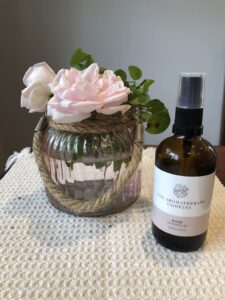How to support our wellbeing through transitions, challenges & uncertainties.
Life is filled with transitions, challenges and uncertainties.
The human being has an extraordinary attachment to what is called the “comfort zone” . Not necessarily because it is comfortable, but because it is known, it’s familiar.
Even though the human brain is perfectly capable to deal with challenges, volatility, uncertainties and transitions; still we do not feel comfortable in a constantly changing environment.
So what would be a possible way to navigate transitions with serenity, enthusiasm and confidence?
How can we gain resilience?
Taking care of three important dimensions will help us experience a noticeable improvement in our resilience.
👉The physical dimension
Exercise cares for the brain
It has been proved that when we exercise the possibilities of falling into depression or anxiety are drastically reduced. Working from home increases the opportunities not to exercise. Recognising this, be creative and find ways to keep your body moving.
Look after your nutrition
During transitions, we can all experience stress, because we are “out of our comfort zone”. When stress is high we generate cortisol. Cortisol wants to fill the blood with the sugar so we crave sweets. Sugar generates inflammation in the guts, which triggers inflammation in the brain, and we are back into depression and anxiety. It is a vicious circle. We do not need that if we want to stay enthusiastic.
Better your sleep routine
Our society does not completely grasp the importance of sleep. It is not a waste of time. Just one example: during sleep, our bodies boost our immune system, preventing infections and illnesses – regular good sleep has been shown to reduce the risks of cancers. You can find out more in our blog:
https://www.clarisaayllon.com/why-do-we-need-sleep-ideas-tips-to-better-our-sleep-routine/
👉 The mental dimension:
Avoid letting our minds dwell on regrets about the past, for things we have done or left undone. And avoid projecting ourselves into the future and worrying for what’s coming, thinking we might not be able to manage. It fills our mind (and body) with worries and guilt.
How can we stop a racing mind?
One way is to “Treat Our Mind Like a Muscle”. Training the mind to stay focus in the here and now.
Mindfulness and meditation are excellent practices, they are at hand and easy to follow. You can find guided exercises with different lengths in many free apps, to help you stay in “the here and now”. Doing so allows us to stay focused on the task at hand. This has a very positive influence on our immune system, which is key in this transition season into winter. We feel more relaxed and confident, and our performance improves. These techniques are also quite potent to induce sleep naturally. Look for the ones designed for this purpose, finishing quietly, so they do not wake you up just as you are drifting off to sleep.
👉The emotional dimension:
This dimension refers to the Love for ourselves, but it goes beyond us too. It’s the care for others, it’s the love for nature, it’s embracing the diversity with a geocentric mindset. It’s compassion, empathy and forgiveness. There are many ways of connecting: if we have a “what” and a “why” we always find a “how”.
What oils can we use to support our wellbeing through transitions, uncertainties, challenges?
Cypress essential oil, distilled from this tall, thin tree with its long, deep roots, flexible, adaptable and grounding, is a great ally.
Cypress helps to restore calm, brings strength and a sense of harmony, dissolves remorse, instils optimism and comforts those in bereavement. Interestingly enough, the tree stays green during autumn and winter to support us. It’s like nature saying “I am here, I am green even in winter, I am supporting you” !
So even if the cypress aroma is not your cup of tea, there’s plenty to blend it with and get all the benefits. Cypress brings balance and synergy into any blend.
Recommended blends for your diffuser with Cypress:
🌿 With Eucalyptus, Peppermint or Tea Tree for colds, flu, coughs, virus, bacteria, bronchitis.
🌿 With Grapefruit to stop the sweet cravings.
🌿 With Rosemary for concentration and be present in “the here and now”.
🌿 With Juniper Berry for detox.
🌿 With Clary Sage for women’s personal care. To alleviate symptoms associated with menopause consider blending Cypress with Rose, Geranium or Lavender.
🌿 With Cedarwood, Rosemary or Sandalwood for harmony and serenity.
🌿 With Frankincense or Neroli for relaxation and major life transitions. 
🌿 With Lemon, Thyme, Cinnamon, Ginger, Clove or Palmarosa to boost immunity, bring warmth and enthusiasm into the atmosphere.
Like to find out more? We can work together and discover the blend that works for you: https://www.clarisaayllon.com/working-together/
“It has recently being demonstrated in multiple scientific studies, that being grateful benefits our wellbeing. Every morning we should bring to our attention 4 to 5 things we are grateful for. Don’t take them for granted!
 When we live in gratitude, we focus our mind on everything present in our life rather than what is missing. If we look for the “missing” we will find plenty. Practising it even in the worst moments when it does not come out intuitively is very important for our wellbeing. In that sense rose oil is at the centre of love, for yourself, and for others, restoring empathy and kindness.
When we live in gratitude, we focus our mind on everything present in our life rather than what is missing. If we look for the “missing” we will find plenty. Practising it even in the worst moments when it does not come out intuitively is very important for our wellbeing. In that sense rose oil is at the centre of love, for yourself, and for others, restoring empathy and kindness.
… Lets keep ourselves flexible, so we come out of the transitions stronger. ...💪💪
Found these helpful?
Like to find out more?



